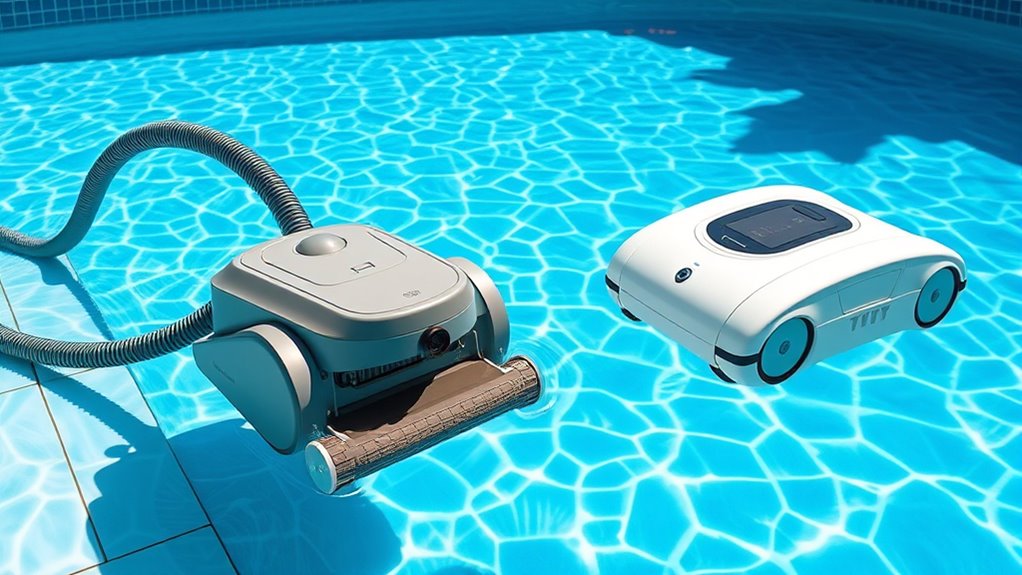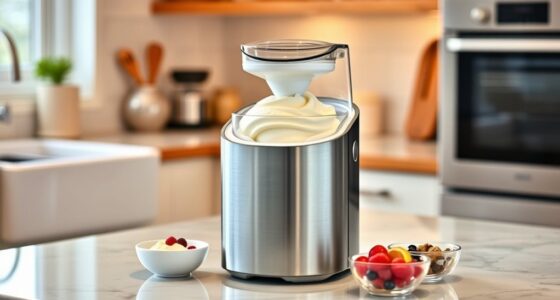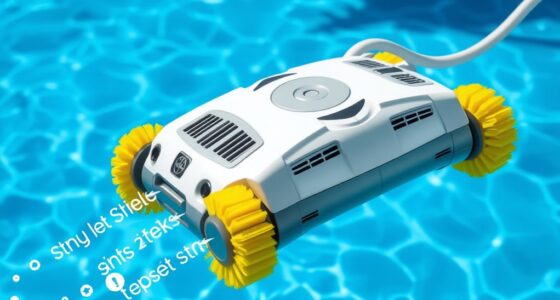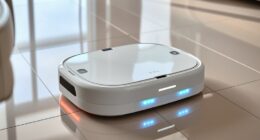Suction pool cleaners are simple, affordable, and connect directly to your pool’s filtration system, making them easy to maintain but less thorough. Robotic pool cleaners are more advanced, operate independently, and provide thorough cleaning with less energy and effort, but they cost more upfront. Depending on your budget and cleaning needs, each has benefits. To discover which option suits your pool best, explore the details below.
Key Takeaways
- Suction cleaners depend on the pool’s pump and filter system, while robotic cleaners operate independently with their own power source.
- Robotic cleaners provide more thorough cleaning and advanced navigation compared to suction cleaners.
- Robotic models are generally more energy-efficient, reducing strain on the pool’s filtration system and lowering energy costs.
- Suction cleaners are simpler, easier to set up, and more budget-friendly, but may require manual intervention for detailed cleaning.
- The choice depends on maintenance preferences, cleaning needs, and budget, with robotic cleaners offering higher performance and automation.
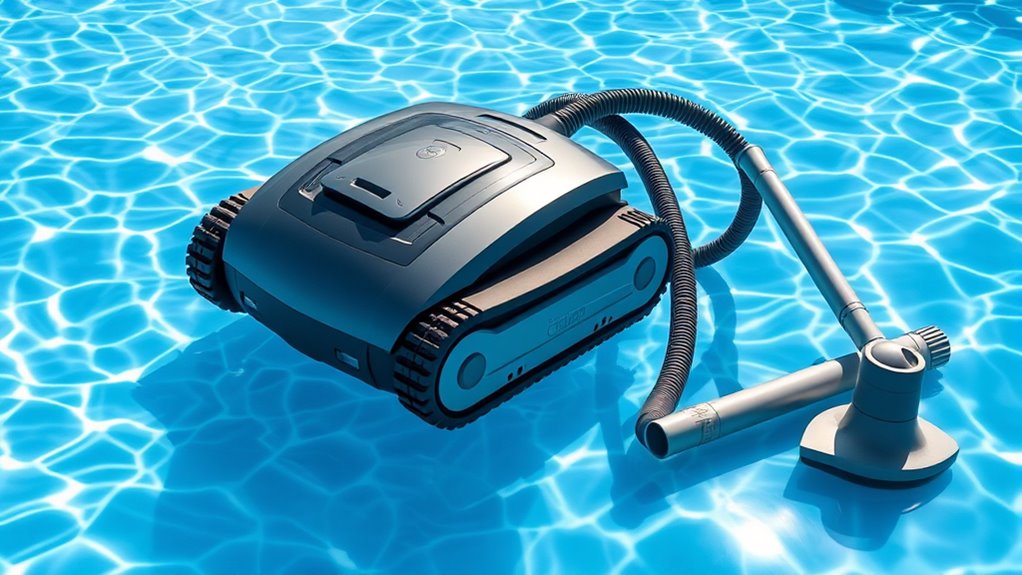
When it comes to keeping your pool clean, choosing the right cleaner can make all the difference. Your decision impacts not only how well your pool stays pristine but also how much effort and energy you spend on maintenance. Two popular options are suction pool cleaners and robotic pool cleaners, each offering distinct advantages depending on your needs and preferences. To keep your pool in top shape, it’s crucial to understand how these cleaners differ, especially in regard to pool maintenance and energy efficiency.
Suction pool cleaners connect directly to your pool’s skimmer or dedicated suction line. They operate by using the suction power of your pool’s filtration system to move around the pool floor and walls, collecting debris into an attached bag or filter. These cleaners are generally simple to set up and maintain, making them a practical choice for many pool owners. They excel at cleaning large debris and are effective for regular maintenance. However, since they rely on your pool’s pump and filter system, their energy efficiency can vary. Because they depend on the existing filtration system, they tend to consume more energy during operation, especially if the filter system is less efficient or older. This can lead to higher energy bills over time, which is a critical consideration if you’re aiming for energy-efficient pool maintenance.
Robotic pool cleaners, on the other hand, are autonomous devices that operate independently of your pool’s filtration system. They run on their own power source—batteries or cords—and typically feature advanced navigation and cleaning algorithms. Robotic cleaners are designed to scrub, vacuum, and filter debris from all pool surfaces with minimal input from you. They tend to be more thorough in cleaning and often come with programmable schedules, saving you time and effort. From an energy efficiency standpoint, robotic cleaners are often more efficient because they use less power compared to running your pool’s entire filtration system. They also tend to have better brush systems that improve cleaning performance, reducing the need for frequent manual intervention. This means less strain on your pool’s pump and filtration system, which can extend their lifespan and reduce ongoing pool maintenance costs.
Additionally, advancements in heat pump technology are making these systems more attractive for energy-conscious pool owners seeking sustainable solutions that can further decrease energy consumption and environmental impact.
Choosing between these two depends on your priorities. If you prefer a low-cost, straightforward solution and don’t mind higher energy use, a suction cleaner might suit you well. But if you’re looking for a more efficient, low-maintenance option that offers better cleaning coverage and less impact on your energy bills, a robotic cleaner is likely the better fit. Ultimately, your choice should align with your goals for pool maintenance, budget, and energy efficiency, ensuring your swimming experience stays enjoyable while keeping your pool in excellent shape.
Frequently Asked Questions
Which Type Is More Energy-Efficient for Large Pools?
When choosing a pool cleaner for large pools, you might wonder which is more energy-efficient. Generally, suction pool cleaners tend to have lower energy consumption because they use less power, focusing on simple operation. Robotic pool cleaners, while often more advanced and thorough, can consume more energy due to their motors and additional features. For better power efficiency, consider the cleaner’s energy consumption and how it fits your pool size and cleaning needs.
Can Both Cleaners Handle Algae and Heavy Debris Effectively?
Did you know that algae can cause health issues and make your pool look unappealing? Both cleaners can handle algae removal and heavy debris, but their effectiveness varies. Robotic cleaners often excel at thorough cleaning and reaching tricky spots, while suction models are powerful for heavy debris. You’ll want to choose based on your pool’s specific needs, ensuring it stays clean, safe, and inviting.
Are Robotic Pool Cleaners Compatible With All Pool Shapes?
Robotic pool cleaners offer excellent pool shape versatility, making them suitable for various designs, from irregular to geometric shapes. They come with advanced sensors that adapt their cleaning pattern flexibility, ensuring thorough coverage no matter your pool’s layout. You won’t have to worry about hard-to-reach areas, as these cleaners adjust their movements automatically. So, if you value efficient cleaning tailored to your pool’s unique shape, robotic cleaners are a smart choice.
What Is the Typical Lifespan of Suction vs. Robotic Cleaners?
You might think your pool cleaner lasts forever, but the truth is, durability varies wildly! Suction cleaners typically last 5-8 years, while robotic cleaners can go up to 10-15 years with proper care. The durability comparison depends heavily on build quality and maintenance. Always check warranty coverage; it’s your safety net against early breakdowns. With good care, your investment can keep your pool sparkling for years to come!
Do Robotic Cleaners Require Special Maintenance or Parts?
Robotic cleaners do require some manual maintenance and occasional replacement parts. You’ll need to clean the brushes and filters regularly to keep them running smoothly. Sometimes, you might need to replace parts like brushes, wheels, or the battery over time. But overall, maintenance is straightforward, and most parts are easy to find. Proper upkeep guarantees your robotic cleaner stays efficient and lasts longer, saving you time and money.
Conclusion
So, as you weigh your options, remember the battle between the old and new—like David facing Goliath. Whether you choose the dependable suction cleaner or embrace the future with a robotic marvel, trust your instincts to find what’s right. With either choice, you’re inviting a cleaner, brighter pool into your home, transforming your backyard into a peaceful oasis—your personal Atlantis. Plunge into confidently, knowing you’re making a splash that lasts a lifetime.
